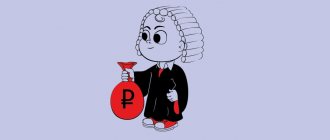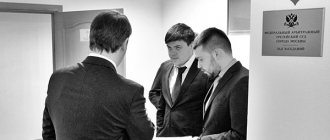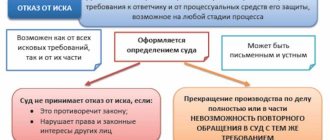An expert's opinion is important evidence that can be decisive in a case. But any examination can be challenged. All participants in the trial have the right to appeal the examination (Article 79 of the Code of Civil Procedure of the Russian Federation). But having the opportunity to appeal the examination in civil proceedings and proceeding to directly challenge it are two different things. To challenge an expert’s opinion correctly and in a timely manner, it is better to contact a professional lawyer. Our task is to provide you with the opportunity to choose a competent and experienced representative.
application (petition) for examination in civil proceedings.
Before talking about the specifics of the procedure for appointing an expert examination in civil proceedings, it is necessary to find out who the expert is and what he is needed for.
An expert is a person who has special knowledge on issues related to the case under consideration and is appointed by the court to give an opinion. Thus, based on this concept, we can conclude that the expert makes conclusions. Expert opinions in accordance with the Code of Civil Procedure of the Russian Federation are evidence in the case, which allows the parties to refer to them to substantiate their claims and objections. An examination is appointed by the court in cases where questions arise in the process that require special knowledge in various fields of science, technology, art, and craft.
An examination may be ordered at any stage of the process before the court makes a final decision. It is important to note that it is best to submit a request for an expert examination at the stage of preparing the case for trial, so as not to delay the process and avoid postponing the court hearing.
Expertise: how to convince the court to appoint it or refuse it
How not to “fly” with the examination
Whether or not to order a forensic examination remains at the discretion of the court. He makes this decision if it is necessary to establish circumstances in the case that require special knowledge (handwriting, accounting, etc.). “The question of ordering an examination, of course, depends on the texture and complexity of the case,” says partner of the Law Office Egorov, Puginsky, Afanasyev and Partners Egorov, Puginsky, Afanasyev and Partners Federal Rating. group Antitrust law (including disputes) group Arbitration proceedings (major disputes - high market) group Compliance group Corporate law/Mergers and acquisitions group International litigation group International arbitration group Maritime law group Dispute resolution in courts of general jurisdiction group Capital markets group Family and inheritance law group Insurance law group Labor and migration law (including disputes) group Criminal law group Private capital management group Pharmaceuticals and healthcare group Financial/Banking law group Environmental law group Bankruptcy (including disputes) group Foreign trade activities/Customs law and currency regulation group PPP/Infrastructure projects group Land law/Commercial real estate/Construction group Intellectual property (including disputes) group Tax consulting and disputes (Tax consulting) group Tax consulting and disputes (Tax disputes) group Natural resources/Energy group TMT (telecommunications, media and technology) group Transport law group Digital Economy 1st place By revenue 1st place By revenue per lawyer (more than 30 lawyers) 1st place By number of lawyers Company profile Vera Richterman. An examination will not be ordered if it does not confirm the circumstances that are to be established in the case.
The Supreme Court prohibited ordering a re-examination under the guise of a new one
“For example, in one case a dispute was considered about the quality of video content, which the customer did not like. — says Yuri Vorobyov, partner of Pepelyaev Group Pepelyaev Group Federal Rating. group Foreign trade activities/Customs law and currency regulation group Tax consulting and disputes (Tax consulting) group Tax consulting and disputes (Tax disputes) group Labor and migration law (including disputes) group Digital economy group Antimonopoly law (including disputes) group Land law/Commercial real estate/Construction group Intellectual property (including disputes) group Compliance group Natural resources/Energy group Pharmaceuticals and healthcare group Environmental law group Bankruptcy (including disputes) group Corporate law/Mergers and acquisitions group Family and inheritance law TMT group (telecommunications, media and technology ) group Financial/Banking Law group Arbitration proceedings (major disputes - high market) group Dispute resolution in courts of general jurisdiction. — To confirm his position, the plaintiff requested a sociological examination. But the court refused because the opinion of the selected focus group could not speak about the quality of the result.”
To achieve the appointment of an examination, the lawyer advises to describe the reasons for the request in as much detail as possible, and justify why the circumstances of the case cannot be established without an examination. Experts suggest adding the opinions of extrajudicial experts to the case materials.
In order to obtain an examination, one can refer to similar judicial practice, where the resolution of disputes of the same nature without an examination entailed the cancellation of judicial decisions.
Vera Richterman, EPAM partner
The refusal to order an examination itself cannot be appealed separately from the judicial act on the merits of the dispute. If the court refuses to satisfy the request to order an examination, you can try to use this refusal as a basis for canceling the judicial act, because it was made with an incomplete examination of the circumstances that are key to the correct resolution of the dispute.
How to write questions
Participants in the case cannot pose questions to the expert directly; the court must do this at the request of the parties. This was clarified by the plenum of the Supreme Arbitration Court in paragraph 11 of the resolution “On some issues in the practice of application by arbitration courts of legislation on examination” dated April 4, 2014. At the same time, the expert’s conclusion in itself does not mean a solution to the issue: the court may refuse to accept the results of the examination, but is obliged to motivate its decision and evaluate the arguments presented.
The Supreme Court reminded how to conduct examinations
Partner Allen & Overy Allen & Overy Federal rating. group Corporate Law/Mergers and Acquisitions group Maritime Law group Natural Resources/Energy group TMT group (telecommunications, media and technology) group Transport Law group Financial/Banking Law group Bankruptcy (including disputes) group International Arbitration group Arbitration proceedings (major disputes - high market ) Igor Gorchakov says that when composing questions, you must clearly understand what answer you want to receive. The question must be formulated unambiguously, clearly and understandably for the expert: the expert and the parties will not be able to communicate before presenting the conclusion in court, so there will be no opportunity to clarify the questions. In addition, an unclearly formulated question can confuse the judge. Namely, he transfers the case materials for analysis to an expert.
“If you don’t do the work of correctly formulating the question, your opponent will do it, and formulate the questions in a way that is beneficial to him and his position in the case.”
Igor Gorchakov, partner at Allen & Overy
Yuri Vorobyov advises in difficult cases to involve a specialist who will help formulate questions and then be able to act as a reviewer on the examination performed.
How to prevent a dispute from being drawn out by an examination
Expertise takes time, which participants in cases take advantage of. They can achieve it with one goal - to delay the resolution of the dispute. According to Vera Richterman's observations, about a third of such statements are aimed solely at delaying the trial. Thus, according to Yuri Vorobyov, all steps associated with this procedure (selection of an expert, determination of the range of issues, examination period, study of the results, review and questions to the expert) on average increase the process by 4-5 meetings. And the total period for consideration of the case in such cases can increase to six months or more. The lawyer believes that an intention to delay the case may be indicated by a request for an examination at the later stages of the trial. “In this case, you can draw the court’s attention to the fact that the request for examination was filed a long time after the materials on the basis of which it was proposed to conduct the study were submitted to the court,” says Richterman. “It must be pointed out that the party did not provide an out-of-court conclusion, which could eliminate the need for an examination, etc.”
For 4-5 meetings
the process increases if there is expertise
It is possible to prove to the court that there are no grounds for an examination, including by indicating that the issue does not require special knowledge.
“For example, in order to calculate the company’s net assets on the balance sheet as of a certain reporting date, it is not necessary to appoint an accounting forensic examination - this is a mathematical exercise where all the data is in the corresponding lines of the balance sheet, and the calculation methodology is approved by regulation,” says Gorchakov.
Delaying cases and mistakes in the State Automated System “Justice” deprived the judge of his robe
Another way that a lawyer calls is to prepare your own expert’s report. “If this conclusion is drawn up professionally and in accordance with the requirements of the law and gives an unambiguous answer to the relevant question, it will be easier to convince the court to limit itself to this evidence and not order a forensic examination,” explains Gorchakov.
Lawyer AB KIAP KIAP Federal rating. group Arbitration proceedings (medium and small disputes - mid market) group Compliance group Family and inheritance law group Intellectual property group (including disputes) group Dispute resolution in courts of general jurisdiction group Labor and migration law (including disputes) group Criminal law group Antimonopoly law (including disputes) group Foreign trade/Customs law and currency regulation group Land law/Commercial real estate/Construction group Corporate law/Mergers and acquisitions group International arbitration group TMT (telecommunications, media and technology) group Financial/Banking law group Bankruptcy (including disputes) group Tax consulting and disputes (Tax consulting) Company profile Daniil Zherdev says that in most cases, in order to delay the case, petitions are filed for a handwriting examination of the documents on which the claims are based. According to him, in such cases, judges easily determine abuse and refuse to satisfy the request.
“Judicial practice is developing in such a way that any request for a handwriting examination is regarded by the court as an attempt to delay the process, and the burden of proving the validity of such a request is placed on the applicant”
Daniil Zherdev, lawyer at KIAP
According to Zherdev, the applicant’s dishonesty may be indicated by the fact that the person whose signature they want to check does not come to court to provide handwriting samples. In addition, it is suspicious if a disputant does not declare falsification of evidence, the authenticity of which he questions. The lawyer suggests that the court especially pay attention to the latter.
“Pocket experts” and how to recognize them
Not only the participant in the case, but also the expert himself may turn out to be dishonest. To counter this, civil and arbitration procedural legislation contains restrictions on the appointment of an expert.
So, according to Art. 23 APC and Art. 18 of the Code of Civil Procedure, an expert in a case cannot be someone who, in the previous consideration of this case, was a judge (including a foreign arbitration court, or arbitration court), a prosecutor, an assistant judge, a secretary of a court session, a representative, an interpreter, a witness, or judicial conciliator.
An expert can be challenged if he is a relative of a participant in the case or his representative, or was in official or other dependence on them. Anyone who has a direct or indirect interest in the outcome of the case, or who has made public statements or given an assessment on the merits of the case, will not be able to conduct an examination.
According to Vorobyov, the best indication of an expert’s bias is the “futility” of the examination—that is, when it obviously does not bring clarity to a controversial issue. For example, one of the parties wants to conduct an examination to prove the authenticity of a copy of a document. But the examination can only give a probabilistic conclusion, which cannot be used as the basis for a judicial act, because the probability of the opposite conclusion will remain. According to Vorobyova, some experts turn a blind eye to this, and bias can be suspected here.
Another sign that a lawyer names is the unknownness of the expert, doubts about his qualifications, or participation in conducting examinations of different nature. In addition, unrealistic deadlines and low cost of examination may also indicate expert bias. Igor Gorchakov explains that in such situations, the bulk of the remuneration to the “bought” expert is paid directly by the unscrupulous party, so the “formal” cost of the examination turns out to be lower.
Possible signs of a “pocket” examination
- unknown expert;
- questionable or non-core qualifications;
- examination period is too short;
- low cost of examination;
- contacts with the party who proposed the expert (for example, in other cases).
“The calculation here is that the court will appoint an expert as the cheapest, if he formally meets the requirements,” says the lawyer. “As a rule, such “pocket” experts “shine” in many cases, and there are often cases when the courts do not accept their expertise.” In such situations, he suggests searching for court cases involving such an expert and seeing how he performed in them.
“In this case, we must seriously prepare to remove such an expert, and if that doesn’t work, to challenge the conclusions of his examination - for example, by preparing a conclusion from another respected expert on the same issue or a review of such an expert on his conclusion,” adds Gorchakov.
The lawyer also names other reasons to doubt impartiality. He gives an example of a case his company handled. According to Gorchakov, then “the court doubted the impartiality of the expert only on the grounds that the expert was a British company, and it was proposed by a British bank.” Moreover, the lawyer says that the court may question the impartiality of an expert if, after his appointment, he had contacts with one of the parties to the dispute - including if these contacts were not specifically related to this process. For example, this could be a request to participate in another matter.
Bad faith may also be indicated by the fact that an expert or expert organization has previously participated in cases with the same participant. Daniil Zherdev adds that he often encounters this in claims of large companies. According to him, the lack of impartiality in such a situation can be proven by providing copies of judicial acts that confirm the fact of constant cooperation between the plaintiff and experts.
Gorchakov adds that one of the signs that an expert is “pocket” is that the party proposing his candidacy insists on the appointment of this particular expert and actively objects even to the candidates proposed by the court. The second possible sign is a clear discrepancy between the qualifications of the expert and the subject of assessment in the case, says the lawyer. “For example, in one of the cases, as a candidate for a forensic expert to assess the value of an oil company, the party persistently proposed an expert specializing in real estate valuation,” Gorchakov gives an example.
- Arbitration process
- Civil process
Rights and responsibilities of an expert in civil proceedings.
The expert is obliged to accept the examination assigned to him by the court and conduct a full study of the presented materials and documents; give a reasoned and objective opinion on the questions posed to him and send it to the court that ordered the examination; appear when summoned by the court to personally participate in the court hearing and answer questions related to the research conducted and the conclusion given by it.
If the questions raised go beyond the expert’s special knowledge, he is obliged to send the appropriate notification to the court.
The expert is obliged to ensure the safety of the documents provided to him, and also to return them to the court along with an opinion or a message about the impossibility of giving an opinion.
If the expert does not submit an expert opinion within the time limit established by the court ruling, provided there is no reasoned message from the expert or forensic institution about the impossibility of conducting the examination in a timely manner or about the impossibility of conducting the examination for reasons provided for by the Code of Civil Procedure, a fine is imposed on the director or the culprit.
The expert does not have the right to independently collect materials for the examination; enter into personal contacts with the participants in the case, if such contacts may raise doubts about the expert’s disinterest; disclose any information that became known to him during the examination; inform anyone about the results of the examination, with the exception of the court that appointed it.
An expert or a forensic institution does not have the right to refuse to conduct an examination assigned to him within the time period established by the court, citing the refusal of the party to pay for the examination before it is carried out. In case of non-payment of the examination by those participants in the process on whom payment is entrusted, the forensic expert sends a conclusion with documents confirming the costs of the examination. The court recovers such an amount from the participants in the process in accordance with the Code of Civil Procedure of the Russian Federation. In practice, the forensic examination is paid for by the party requesting it. But the court has the right, at the request of a party, to recover the costs of payment from the other party. An examination ordered at the initiative of the court is paid for from the budget.
The expert, if necessary, has the right to familiarize himself with the case materials related to the subject of the examination; has the right to ask the court to provide additional materials and documents for research; ask questions to persons involved in the case and witnesses, as well as petition for the involvement of other experts in conducting the examination.
Contents of the court ruling on the appointment of an examination
Article 80 of the Code of Civil Procedure of the Russian Federation.
1. In the ruling on ordering an expert examination, the court shall indicate the name of the court; the date of appointment of the examination and the date no later than which the conclusion must be drawn up and sent by the expert to the court that appointed the examination; names of the parties in the case under consideration; name of the examination; facts for confirmation or refutation of which an examination is appointed; questions posed to the expert; surname, name and patronymic of the expert or the name of the expert institution entrusted with carrying out the examination; materials and documents presented to the expert for comparative research; special conditions for handling them during research, if necessary; name of the party that pays for the examination.
2. The court ruling also states that for giving a knowingly false conclusion, the expert is warned by the court or the head of the forensic institution, if the examination is carried out by a specialist from this institution, about the responsibility provided for by the Criminal Code of the Russian Federation.
Evasion of parties from participation in examination in civil proceedings.
If a party evades participation in the examination, fails to provide the necessary materials and documents for experts, and if without such participation the examination becomes impossible, the court has the right, depending on which party evades the examination, as well as what it has for it value, has the right to recognize the fact for the clarification of which the examination was appointed as established or refuted.
Thus, the legislator has established a position in which attempts to deviate from participation in the examination will always turn out not to be in favor of such a person.
The procedure for appealing in administrative proceedings
Administrative proceedings are regulated by the Code of Administrative Proceedings, which stipulates that if issues that require special knowledge arise during the consideration of an administrative case, the court appoints an examination (Article 77) .
At the same time, the CAS establishes similar rules to the Code of Civil Procedure for appealing court decisions on the appointment of an examination. So, according to Art. 313 CAS , rulings of the court of first instance can be appealed to the appellate court separately from the court decision by the parties and other persons participating in the case (private complaint), and the prosecutor can make a presentation if:
1) this is provided for by the CAS;
2) the court’s ruling excludes the possibility of further movement of the administrative case.
Private complaints or presentations of the prosecutor are not filed against court rulings that do not meet the specified conditions, but objections regarding them may be included in the appeal or presentation.
Accordingly, taking into account the logic of the Supreme Court regarding the possibility of appealing court rulings on the appointment of forensic examinations in civil proceedings, this issue is resolved in a similar way in administrative proceedings - a court ruling on the appointment of an examination can be appealed only in terms of issues related to legal costs, as well as suspension of the proceedings.
Is it possible that an expert refuses to conduct an examination?
Such cases are possible. For example, they may occur when an expert does not have sufficient information and knowledge to give an accurate and reliable answer to the questions that are put before him. By virtue of Part 1 of Art. 85 of the Code of Civil Procedure of the Russian Federation in such a situation, the expert sends a message to the court stating that he is not able to conduct an examination. In addition, the expert may refuse to carry out the procedure if the case materials are not sufficient to draw clear conclusions on the questions posed.
If the expert refuses, the court may involve another person who has the opportunity to answer the questions.
There are no other grounds other than those listed above that would allow an expert to refuse to carry out the procedure. Moreover, the court may hold the expert accountable in the form of a fine, the amount of which can reach 5,000 rubles, for an unreasonable refusal.
Even if the party who must pay for the expert's services does not do so, the examination must be carried out. In such a situation, after the procedure, the expert provides the court with documents that confirm the expenses, and the court resolves the issue of payment of funds.
Questions for a forensic expert
The correct formulation of the questions posed to the expert is of decisive importance when conducting an examination. Questions should be asked in such a way as to prevent misunderstanding and interpretation. The questions should already imply a possible answer from the experts that will be relevant to the case. It is recommended to avoid general questions, taking into account the specifics of expert tasks. When asking questions, it should be taken into account that the experts' answers will most likely be speculative.
Procedural legislation allows for the involvement of a specialist, including when the court decides on the appointment of an examination. Thus, if the specifics of an expert study are rare, it is difficult to determine the type and type of examination, it is difficult to correctly formulate questions for experts, the best option would be to file a petition to attract a specialist who will assist the court in ordering a forensic examination in a civil case.
Types of forensic examinations
The most common types of forensic examinations are:
- handwriting examination,
- construction expertise,
- medical examination,
- technical expertise,
- psychiatric examination,
- automotive technical examination,
- genetic examination.
In judicial practice in civil cases there are: land management examination, commodity examination, appraisal examination, psychological examination, accounting examination, traceological examination, environmental examination, psychophysiological examination. However, the court may also order other specific types of examination.




